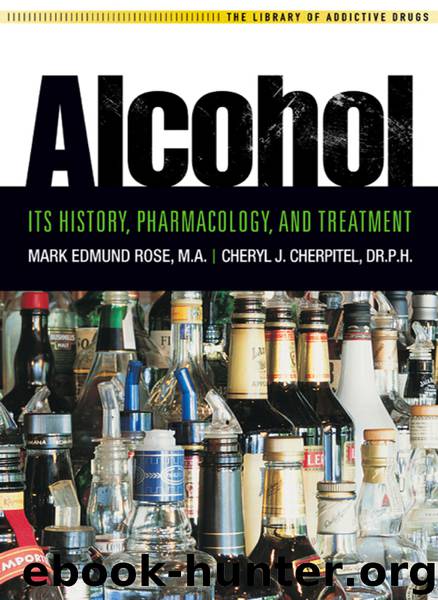Alcohol by Mark E Rose

Author:Mark E Rose
Language: eng
Format: epub
ISBN: 978-1-61649-403-2
Publisher: Hazelden Publishing
Published: 2011-05-03T16:00:00+00:00
Moderation Management (MM) is the only self-help organization to offer its members the goal of achieving moderate drinking, which the organization defines as not more than three drinks per day or nine drinks per week for women, and not more than four drinks per day or fourteen drinks per week for men (Kelly and Yeterian 2008).
Founded in 1993, MM operates under the premise that problem drinking, unlike alcohol dependence, is a learned behavioral habit that can be modified and controlled (WSASHO 2003). The rationale for MM is that an organization with the explicit goal of moderate drinking would attract nondependent problem drinkers who were not interested in abstinence-only programs such as AA or professionally operated Twelve Step treatment programs. MM generated controversy during the 1990s over the wrongful perception that it was attempting to teach alcoholics how to control their drinking (Humphreys 2003).
A survey of 177 MM members was performed to help researchers understand the background of persons who join MM (Humphreys and Klaw 2001). Overall, MM attracted women, younger drinkers, and nondependent problem drinkers. Roughly 15% of the survey respondents indicated moderate to severe alcohol dependence. Thus, the majority of MM members have low-severity alcohol problems, high social stability, and little interest in abstinence-oriented interventions.
Despite a minority of MM members for whom MM offers an insufficient intervention, MM offers a valuable service for the following reasons: (1) some alcohol-dependent persons change their drinking goals from moderation to abstinence after becoming engaged in a supportive setting; (2) most MM members would not seek help for their drinking in abstinence-oriented programs; (3) there are many times more nondependent drinkers with alcohol problems than there are drinkers who are alcohol dependent, and these nondependent drinkers underuse existing resources to seek help for their problem drinking (Humphreys 2003). An optimal development in the future of MM would be to implement a more stringent set of norms and procedures for recognizing and advising participants whose alcohol problems are too severe for MM to address (Humphreys 2003).
Download
This site does not store any files on its server. We only index and link to content provided by other sites. Please contact the content providers to delete copyright contents if any and email us, we'll remove relevant links or contents immediately.
| Publishing & Books | Research |
| Writing |
Asking the Right Questions: A Guide to Critical Thinking by M. Neil Browne & Stuart M. Keeley(5771)
Autoboyography by Christina Lauren(5234)
Eat That Frog! by Brian Tracy(4535)
Dialogue by Robert McKee(4400)
Sticky Fingers by Joe Hagan(4197)
Journeys Out of the Body by Robert Monroe(3624)
Annapurna by Maurice Herzog(3467)
Full Circle by Michael Palin(3448)
Schaum's Quick Guide to Writing Great Short Stories by Margaret Lucke(3378)
Elements of Style 2017 by Richard De A'Morelli(3349)
The Art of Dramatic Writing: Its Basis in the Creative Interpretation of Human Motives by Egri Lajos(3067)
Atlas Obscura by Joshua Foer(2961)
Why I Write by George Orwell(2951)
The Fight by Norman Mailer(2939)
The Diviners by Libba Bray(2935)
In Patagonia by Bruce Chatwin(2927)
The Mental Game of Writing: How to Overcome Obstacles, Stay Creative and Productive, and Free Your Mind for Success by James Scott Bell(2908)
Venice by Jan Morris(2573)
The Elements of Style by William Strunk and E. B. White(2473)
